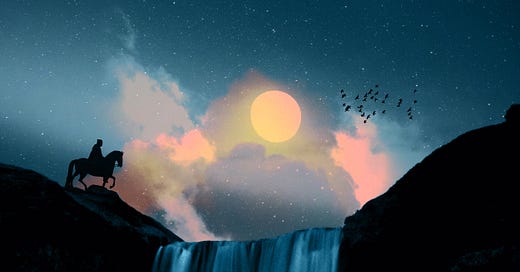The cyclical nature of war mirrors daily life. That feels odd to say, but I think it’s true. There are typical beats in the story — moments of triumph and tragedy. But, there are also those in-between periods full of beauty and brutality, or perhaps beauty because of the brutality. There are times when the wars of our life are looming. Then there's the aftermath, the “war after the war”.
I have this strange belief that the best endings are always bittersweet. At the end of The Lord of the Rings, Frodo is not the same. He's damaged. The world is saved but his own world is gone. Something has been lost despite the victory. As with all things, there is a cost. Seeing characters or even real-life people dealing with this part of their stories is gripping. Somehow, this is when people are at their most beautiful, at least to me.
"You're not quite lovers and you're not quite friends, after the thrill is gone."
— The Eagles
Let me take a brief musical interlude. The quote above is from a song by The Eagles called “After the Thrill is Gone”. It captures an idea quite elegantly: the situation in which you meet someone can sometimes be the main factor that binds you together. When you're on the road as a musician, for example, and things are exhilarating, it's easy to think that it's the person who's evoking those things. When you're out of that situation though... something essential is missing. You were who you were because of when and where you were.
Causes can be like this too. Is it taboo to say that the “peace times” of our lives can be too boring? I spent my childhood raised on WW2 stories from my grandparents and still regularly hear them. I can say with confidence that envy is not among the emotions that spring up while I sit there listening, sipping on a tea and stuffing my face with a sandwich in comfort. The tea and food are made by my 93-year-old grandmother, in case there was any doubt that I’m a special snowflake who needs to be looked after. Only child syndrome notwithstanding, I stand by the sentiment. The battles and wars of our life focus the mind. They give us meaning. We have direction and purpose; something to fight for.
What do you do when the war is over - when the battle lines are no longer clear? These phases often present us with great problems and pain. We can't always tame them. We can lose ourselves during them if we’re not careful. In these ambiguous moments the dust doesn't always quite settle on the ground. Sometimes it hovers wraith-like around us, and those ghosts speak to us in tones somehow too soft to stamp out.





You say things far more eloquently than I ever could, but I think the instinct to war is never lost, only suppressed. There is an enormous rage inside a lot of people that comes out in terrible ways, whether it's raging on social media or spewing vitriol at another person. I'm always fascinated how easy it is to make a complete stranger completely lose their mind over a simple question: "why are you so angry?"
I think the war time of the past generation has a nostalgia because even though people were getting shot at and blown apart on the battlefield, society still knew how to be kind and decent to each other. There was value in simple things because resources were scarce. Music and art was memorable, and melodic, because the soul needed to sing and stay optimistic.
There's more to say but I think that's enough for now. Thanks as always for another great post. I love your description of your grandma!
To grow we need resistance and sometimes turmoil. War is an easy way to provide that much of resistance. It is much harder to make yourself grow in a setting of normality and boredom. War provides a noble excuse for excitement of survival. When boredom after the battle settles in, try to be still and see if the inner battle can answer some questions of growth.